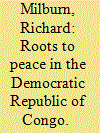| Srl | Item |
| 1 |
ID:
189252


|
|
|
|
|
| Summary/Abstract |
This paper is the first academic attempt to critically bridge the politics of sustainability fix with social conflict theory (SCT) focusing on Indonesia’s foreign-sponsored development of Ultra Supercritical (USC) coal power plants. I examine the contradictory development of ‘green’ projects in Indonesia and specifically unpack: how transnational politico-economic forces have secured a stable sustainability fix for the USC and how they have tamed opposition forces and reshaped governance strategies for intensified accumulation. I attempt to empirically demonstrate how such process unfold through two case studies – Cirebon II developed by Japanese and Korean companies and the Java 7 project funded by China. Albeit each have different alliance formations and strategies, both cases demonstrate that the safeguarding of stable conditions for sustainability fixes of USC power plant development is primarily determined by contestation, conflicts, and compromises between socio-political forces – international fractions of capital, state apparatuses, Indonesia’s PLN and coal oligarchy as well as broader civil society actors. They reshape governing strategies that are ultimately organised through the Indonesian state and react to the selectivity of state strategies which privilege dominant forces. The paper contributes to the existing literature on the political economy of infrastructure and serves to take state transformation into account and to dispel the ‘methodological nationalism’ view that presupposes policy outcome and institutional features are inherent to the mode of capitalism of the investor’s country of origin.
|
|
|
|
|
|
|
|
|
|
|
|
|
|
|
|
| 2 |
ID:
093610


|
|
|
| 3 |
ID:
114775


|
|
|
| 4 |
ID:
133287


|
|
|
|
|
| Publication |
2014.
|
| Summary/Abstract |
The Democratic Republic of Congo (DRC) is endowed with an abundance of natural resources, and the presence of high-value resources such as coltan and diamonds is well known. The country is also endowed with a wealth of biodiversity, although the value of this is often overlooked. This article describes the detrimental impact of armed conflict on this biodiversity and the dangers posed by the return of peace, which is likely to result in increased biodiversity exploitation. The resulting loss of key carbon sinks crucial to the global fight against climate change will affect not only the DRC, but also the international community. Biodiversity is therefore identified as a threat to security but also a valuable asset for development, and this article discusses methods to realize the value of biodiversity in the DRC through the benefits of ecosystem services and income generated from monetizing biodiversity. It concludes by arguing that the false dichotomy of conservation and development as separate entities and objectives needs to change so that conservation becomes a central pillar of security and development work in the DRC and other regions of current or recent armed conflict around the world.
|
|
|
|
|
|
|
|
|
|
|
|
|
|
|
|